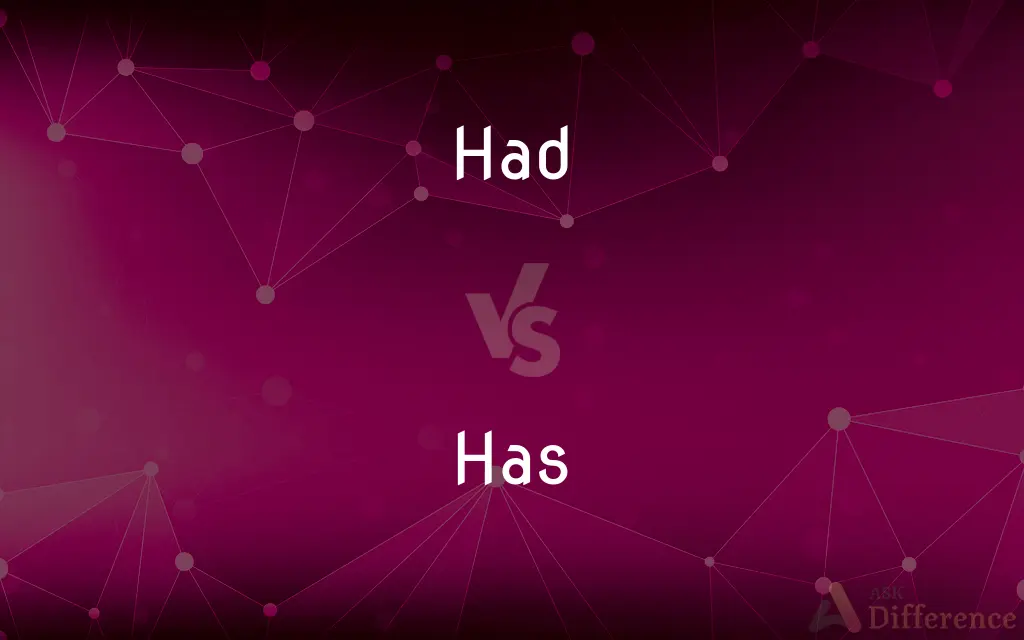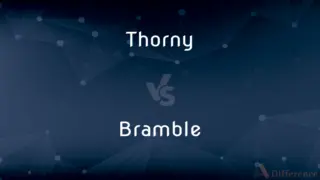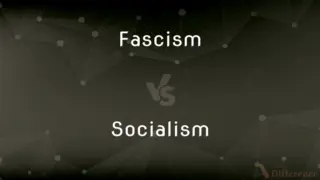Had vs. Has — What's the Difference?
By Fiza Rafique & Urooj Arif — Updated on March 31, 2024
"Had" is the past tense of "have," indicating possession, experience, or actions in the past, while "has" is the present tense form, used for current possession, experiences, or actions.

Difference Between Had and Has
Table of Contents
ADVERTISEMENT
Key Differences
"Had" is used to describe actions or situations that were true in the past but are no longer true now. It can indicate possession, experiences, or completed actions before a specific time. Whereas, "has" is used in the present tense, indicating that the action, possession, or experience is currently true or ongoing.
When talking about completed actions in the past, especially in perfect tenses, "had" is used as part of the past perfect tense to indicate an action that was completed before another action or time in the past. On the other hand, "has" is used as part of the present perfect tense to indicate an action that was completed at an unspecified time before now, or that started in the past and continues in the present.
In terms of possession, "had" conveys that a subject owned or possessed something in the past. For instance, "She had a dog when she was a child" suggests that she owned a dog previously but does not anymore. Conversely, "has" indicates current possession, as in "She has a dog," meaning she currently owns a dog.
"Had" can also be used in conditional sentences to express hypothetical situations or wishes about the past, such as "If I had known, I would have acted differently." Meanwhile, "has" appears in statements expressing facts or routines in the present, like "He has a routine that he follows every day."
The usage of "had" and "has" also differs based on the subject. "Had" is used with all subjects (I, you, he, she, it, we, they), while "has" is only used with the third person singular subjects (he, she, it) in the present tense.
ADVERTISEMENT
Comparison Chart
Tense
Past
Present
Use in Sentences
Indicates past possession, experience, or action.
Indicates current possession, experience, or action.
Example in Perfect Tense
"She had finished her homework before dinner." (Past Perfect)
"She has finished her homework." (Present Perfect)
Use in Conditional Sentences
Used to express hypothetical situations in the past.
Not typically used in conditional sentences.
Subject Agreement
Used with all subjects (I, you, he, she, it, we, they).
Only used with third person singular subjects (he, she, it).
Compare with Definitions
Had
Expresses a wish or condition in the past.
If I had known, I would have come earlier.
Has
Forms the present perfect tense.
He has just finished his meal.
Had
Past tense of have indicating past possession.
She had a cat named Whiskers.
Has
Present tense of have indicating current possession.
She has a beautiful garden.
Had
Used for past perfect tense actions.
They had already left when we arrived.
Has
Describes possession of a quality or feature.
This book has 300 pages.
Had
Indicates past obligations.
I had to complete the project by yesterday.
Has
Shows a habitual action or routine.
She has coffee every morning.
Had
Describes experiences up to a point in the past.
By 2010, he had visited every continent.
Has
Indicates a relationship or characteristic.
My teacher has a lot of patience.
Had
Past tense and past participle of have.
Has
Third person singular present tense of have.
Had
Simple past tense and past participle of have|cap=1.
This morning I had an egg for breakfast.
A good time was had by all.
Had
Used to form the past perfect tense, expressing an action that took place prior to a reference point that is itself in the past.
I felt sure that I had seen him before.
Had
As past subjunctive: would have.
Had
See Have.
And lever me is be pore and trewe.[And more agreeable to me it is to be poor and true.]
Him had been lever to be syke.[To him it had been preferable to be sick.]
For him was lever have at his bed's headTwenty bookes, clad in black or red, . . . Than robes rich, or fithel, or gay sawtrie.
Poor lady, she were better love a dream.
You were best hang yourself.
Me rather had my heart might feel your loveThan my unpleased eye see your courtesy.
I hadde levere than my scherte,That ye hadde rad his legende, as have I.
I had as lief not be as live to beIn awe of such a thing as I myself.
I had rather be a dog and bay the moon,Than such a Roman.
I had rather be a doorkeeper in the house of my God, than to dwell in the tents of wickedness.
Common Curiosities
How do I use 'had' in a sentence?
Use "had" to indicate past possession, experiences, or to form the past perfect tense, showing actions completed before a certain point in the past.
What is the difference between 'had' and 'has'?
"Had" is the past tense of "have," used for past possession or actions, while "has" is the present tense form, used for current situations.
Can 'has' be used with all subjects?
No, "has" is only used with third person singular subjects (he, she, it) in the present tense.
What is the past perfect tense?
The past perfect tense, formed with "had," indicates an action that was completed before another action or time in the past.
Is 'had' ever used in the present tense?
No, "had" is strictly used for past tense situations.
What is the present perfect tense?
The present perfect tense, formed with "has" or "have," refers to actions that were completed at an unspecified time before now or that started in the past and continue in the present.
Can 'has' indicate a past action?
"Has" is used in the present perfect tense, which can refer to actions completed in the past but with relevance to the present.
Why is subject agreement important for 'has' and 'had'?
Subject agreement is crucial because "has" and "had" must match the subject's number and person to maintain grammatical correctness.
Can 'had' and 'has' be used interchangeably?
No, they cannot be used interchangeably as they represent different tenses and time frames.
When should I use 'has' instead of 'had'?
Use "has" to indicate current possession, ongoing actions, or to form the present perfect tense for actions that have an impact on the present.
How does 'had' work in conditional sentences?
"Had" is used in the if-clause of third conditional sentences to talk about hypothetical or unreal situations in the past.
How do 'has' and 'have' differ?
"Has" is used with third person singular subjects in the present tense, while "have" is used with first and second person singular and plural subjects.
Is it correct to say 'If I has known'?
No, the correct form is "If I had known," which is used for hypothetical situations in the past.
What does 'had had' mean?
"had had" is used in the past perfect tense to emphasize that one action occurred before another in the past.
Can 'had' express obligations?
Yes, "had" can express past obligations or necessities.
Share Your Discovery

Previous Comparison
Thorny vs. Bramble
Next Comparison
Fascism vs. SocialismAuthor Spotlight
Written by
Fiza RafiqueFiza Rafique is a skilled content writer at AskDifference.com, where she meticulously refines and enhances written pieces. Drawing from her vast editorial expertise, Fiza ensures clarity, accuracy, and precision in every article. Passionate about language, she continually seeks to elevate the quality of content for readers worldwide.
Co-written by
Urooj ArifUrooj is a skilled content writer at Ask Difference, known for her exceptional ability to simplify complex topics into engaging and informative content. With a passion for research and a flair for clear, concise writing, she consistently delivers articles that resonate with our diverse audience.














































